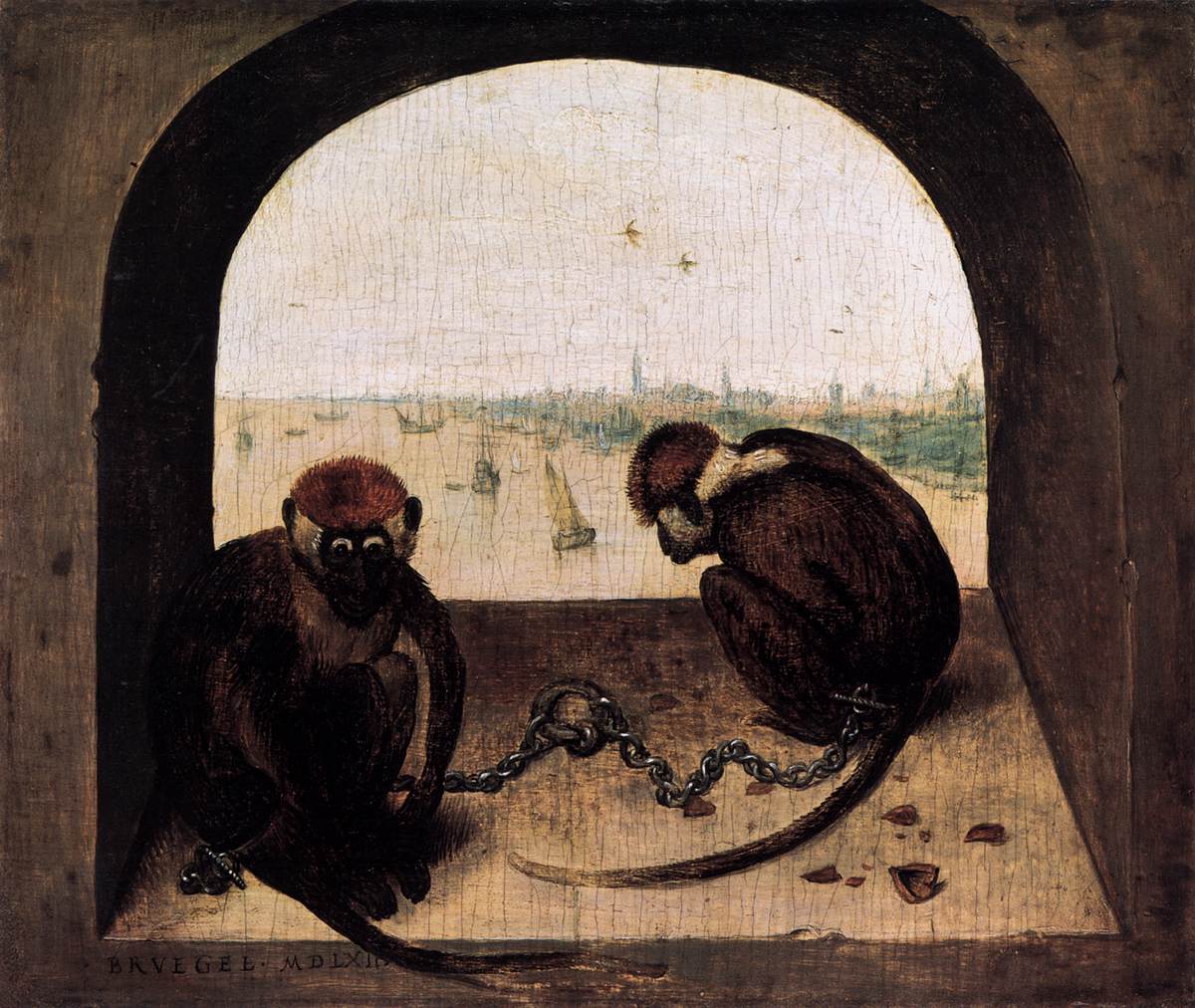.

Capuchin Monkeys (Cebus capucinus, from Cebus apella group), sharing: photo by Frans de Waal, from K. Powell, Economy of the Mind, 2003; image by Ayacop, 2006
Buried among white rooms
Whose lights in clusters beam
Like suddenly-caused pain,
And where behind rows of mesh
Uneasy shifting resumes
As sterilizers steam
And the routine begins again
Of putting questions to flesh
Whose lights in clusters beam
Like suddenly-caused pain,
And where behind rows of mesh
Uneasy shifting resumes
As sterilizers steam
And the routine begins again
Of putting questions to flesh
That no one would think to ask
But a Ph.D. with a beard
And nympho wife who --
But a Ph.D. with a beard
And nympho wife who --
..............................
There, I was saying, are found
The bushy, T-shaped mask,
And below, the smaller, eared
Head like a grave nut,
And the arms folded round.
There, I was saying, are found
The bushy, T-shaped mask,
And below, the smaller, eared
Head like a grave nut,
And the arms folded round.
Philip Larkin (1922-1985): Ape Experiment Room, 1985, in Collected Poems, 1983

Two Chained Monkeys: Pieter Bruegel the Elder, 1562, oil on oak panel, 20 x 23 cm (Staatliche Museum, Berlin)
O beautiful our thumbs
ReplyDeletethat oppose freedom
for all
under spacious skies
and excellent hair products
perfume me, powder me up
for the show
my life depends
on you
cousin
there and all you share
without asking
for anything in return
only the planet
you'll get anyway
some day by default
when all our kind
exist as memory
along with the rest.
"And below, the smaller, eared
ReplyDeleteHead like a grave nut,
And the arms folded round."
What strange baby
have the scientists delivered?
What abuse will begin
to those with different tongues,
stiff thumbs.
I see the little one
is already opposed.
Beautiful Capuchin monks
ReplyDeletesharing their economy
chained by shiny new links
as they gaze at fruit
the best part
peels away.
Busy mind
the chattering
necessary at times
as a light anchor
to this heavy watery world
still there
in any action
very much
Los Angeles.
"And the routine begins again/ Of putting questions to flesh/ That no one would think to ask"
ReplyDeleteIt's easy to identify the subject who isn't in question here.
The phrase "suddenly-caused pain" sticks with me. A carefully chosen moment of arrhythmia, I reckon.
“Ape Experiment Room”--meaning “Let us dig deeper into the heart of the matter.”
ReplyDeleteThe routine administration of pain to helpless animals in the interests of "research" (read: "obtaining of government and corporate funding") is an obscenity that's haunted my path for the past 25 years as I tread tentatively past a "facility" that arose on a spot formerly occupied by some ninety varieties of exotic trees, brought in late in the 19th century to provide that sort of grove which is proverbially an intrinsic feature of academe.
ReplyDeleteWhen the construction began, outraged citizens and students expressed resistance and protest, first "peacefully", and then eventually a bit more aggressively, scaling and "occupying" (not without some inconvenience and risk) for nearly two weeks a hundred-foot high crane being used in the construction.
Of course the protest proved futile.
Those who pass by the place now have no idea what its history might be, or what might lie beneath it.
I think Larkin's poem is not well known because its moral message is too tough to take. The difficult word "nympho" is undoubtedly a factor in its relegation to the state of untouchability. But in my reading, the spasm of disgust that attends "a PH.D. with a beard" is perhaps even stronger.
Larkin of course is rarely nice, and this prevents him being read.
But it's evasive, and probably also cowardly, to attempt to speak of licensed institutional sadism in "nice" language.
Remembering Johnson's Dictionary -- "niceness: superfluous delicacy or exactness".
They are married.
ReplyDeleteThey observe the others
going exotic places,
a PH. D. or two
the window is the only
private place around
a house so full.
It is comfortable enough
at the sill
but limiting.
There are those
heavy links
to a future that trades
nature
for something else
abstract, idea-like.
It stands for freedom
but isn't that at all.
The little monkeys seem
content enough
content with gazing.
The chains are warm.
I love that break between the two stanzas. In the wake of a little space the work comes to seem truly comic and utterly brutal.
ReplyDeleteYes, that terrible pause, carefully yet also with apparent naturalness built into the structure, does so much. The space, the missed heartbeat, a kind of hinge; or a kind of quietly yawning crevasse.
ReplyDeleteThere are moments when the seeming arbitrariness of a formal symmetry turns out to provide the dramatic pivot in a work. This sort of thing doesn't just happen, of course; to make it happen, one must be a master of form, and capable of exploiting it to a purpose.
The rarity of this sort of effect in what one sees of contemporary practise would comprise yet another sign that this is a dying (if not dead) art.